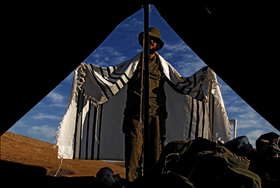Judaism in the IDF
Don't put secular people off religion
Shmuel Shetah, leader of the Ne'emanei Torah Ve-Avodah (Believers in Torah and Work) movement, calls on religious soldiers to respect their secular colleagues
15/03/2011 13:54
Tags: IDF · Israel army · religion in the army

A soldier at prayer Flash 90
Even though it quickly dissipated, the announcement that Ya'ir Naveh will serve as Commander and Chief raised the collective pride of the National Religious public to new heights, writes Shmuel Shetah in an article on .nrg. The mention of Naveh as a candidate for the most senior military post once again raised the debate over the question of the place of religious soldiers in the army.
In recent years, the religious public has played a greater and greater role in combat divisions and influential positions in the IDF. "As a knitted-kippah wearing soldier, I'm proud of this, but at the same time worried about the about the gradual decrease in the number of secular soldiers", said Shetah.
He adds that, against a background of the latest surveys, which indicate the great contribution of religious soldiers, we must insure that the army remains a comfortable place for everyone. "A popular army will continue to be strong only if all the populations in Israel are equally served in it. Any excessive deviation in one direction or the other is liable to lead to dangerous results."
Shetah tells how in his latest training exercise he had the opportunity to pray the afternoon service (minha). When he asked the soldiers to join in, more than half the company rose to its feet. The few secular soldiers who did not stand to pray were a conspicuous minority. The company commander, himself religious, ordered those who were praying to move aside from the shaded shelter. His explanation was clear: no group, whether religious or secular, should feel as if the other group were taking control over them. Those who want to pray, or, on the contrary, those who want cook non-kosher food using their own utensils, should kindly move aside."
As an example of the increasingly stringent stance, he mentions religious military personnel who insist they are incapable of hearing the poem of a female soldier at a memorial ceremony. According to him, it is possible to solve the problem without self-righteous protests, according to him, perhaps next time performances by female soldiers will be avoided in the next ceremony, but in doing this they are liable to hammer another nail into the buried coffin of a popular army. Every religious soldier should and must keep halacha, but this must be done without factionalism, without building unnecessary barriers and without hurting sensitive feelings".